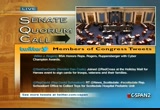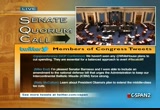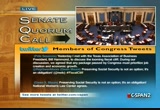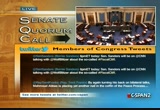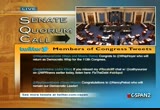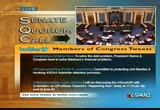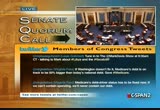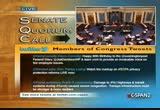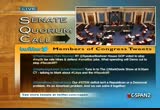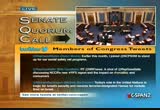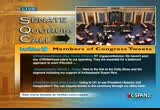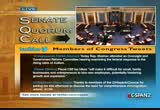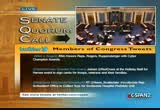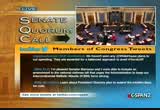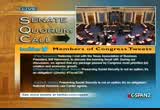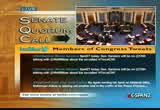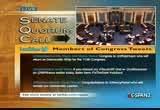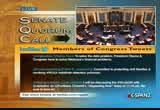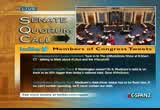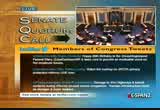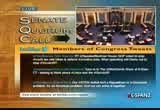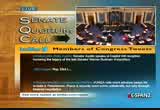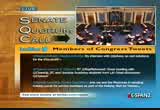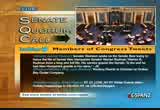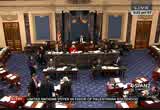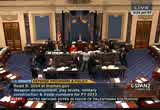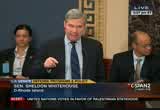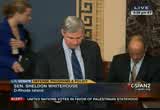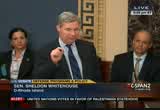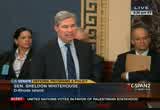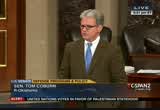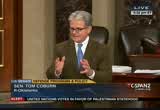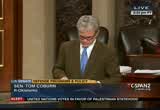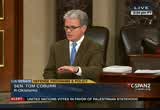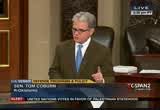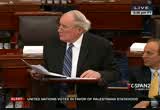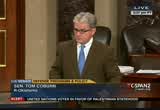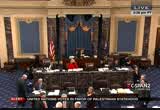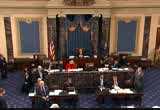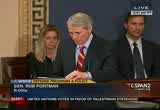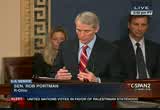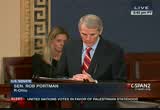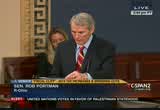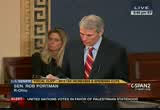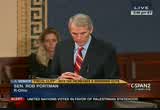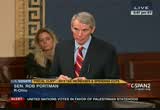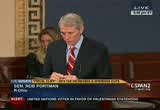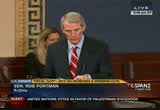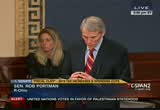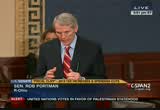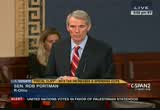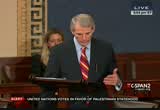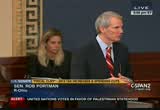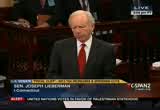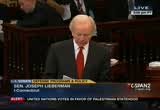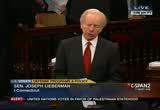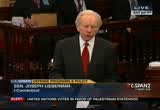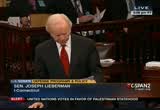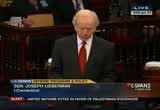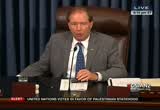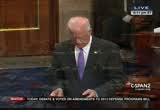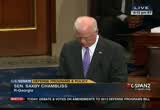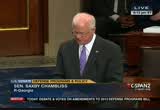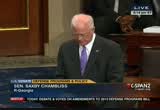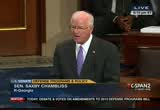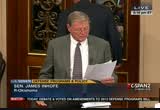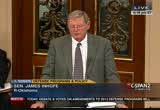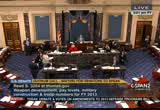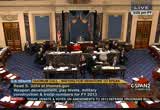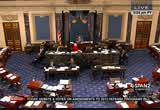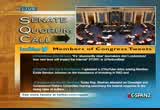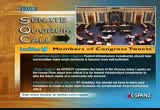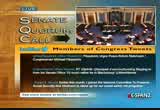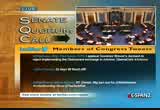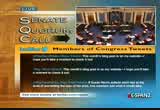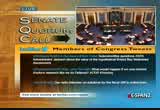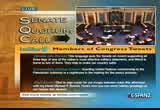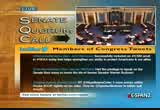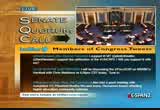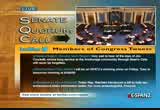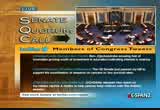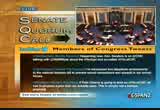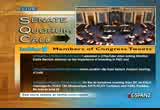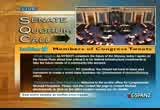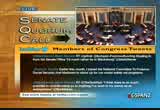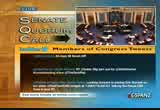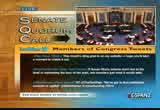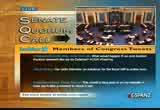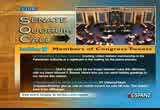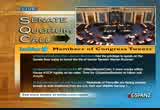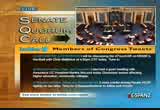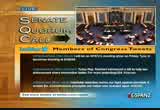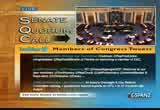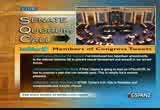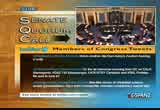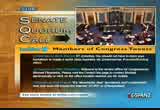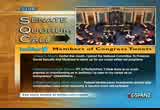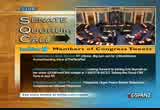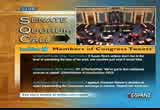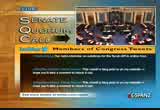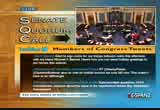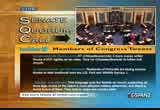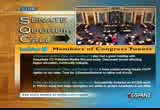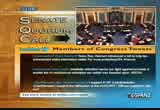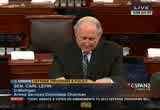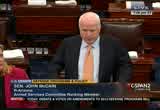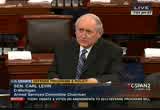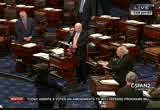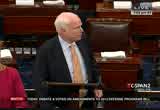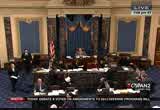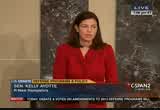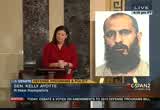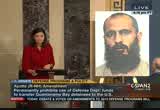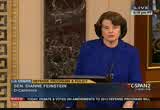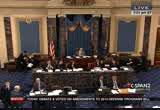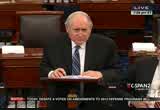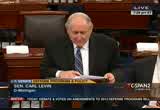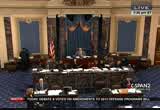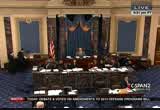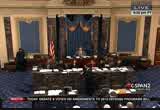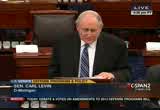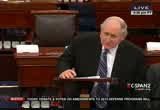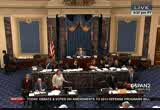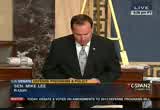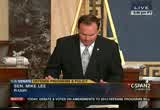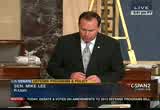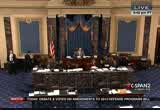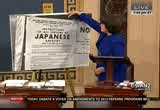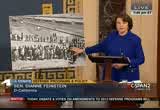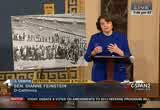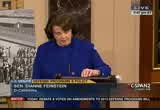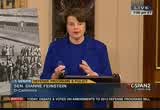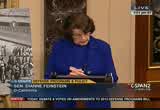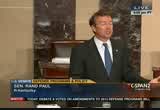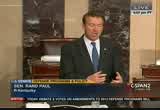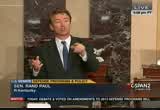tv U.S. Senate CSPAN November 29, 2012 5:00pm-8:00pm EST
5:25 pm
the senator from michigan. mr. levin: i ask unanimous consent that the proceedings under the quorum call be dispensed with. the presiding officer: without objection. mr. levin: i apologize to the chair for a premature request for recognition. mr. president, we are now going to turn to a, an amendment of senator whitehouse which has been cleared, and we've worked to make sure that everybody understands that he's going to proceed to the amendment. and then i understand there's
5:26 pm
not going to be a need for a roll call vote on it. and also i would ask the senator from rhode island about how much time does he believe he would need on his amendment before we hopefully voice vote it. mr. whitehouse: i would say just a few minutes, two or three minutes. mr. levin: i thank the presiding officer and yield -- mr. whitehouse: but i do believe, mr. chairman, that the senator from oklahoma wishes to respond to whatever i say. mr. levin: i appreciate that. i ask unanimous consent there be ten minutes on the whitehouse amendment equally divided between senator whitehouse and senator coburn. the presiding officer: is there objection? without objection. mr. whitehouse: mr. chairman, may i ask of the chairman if the bill -- if he would like the amendment called up now and made pending? or are we simply going to have discussion on it? mr. levin: no, no. we expect now the senator will be calling up his amendment. may i, though, correct what i
5:27 pm
said before. it is possible that there will be a need for a roll call on the whitehouse amendment. the presiding officer: very well. mr. whitehouse: first, mr. president, let me ask unanimous consent that the pending amendment be set aside the senate is not in in order to call up amendment 3180. the presiding officer: without objection, the clerk will report. the clerk: the senator from rhode island, mr. whitehouse, proposes an amendment numbered 3180. whitehouse -- mr. whitehouse: i ask to dispense with further reading of the bill. the presiding officer: without objection. mr. whitehouse: thank you, mr. president. let me thank chairman levin and ranking member mccain for their patience and persistence in allowing us to get to this vote. i think once i discuss the bill for a moment, it might not seem like it required much patience to get here but it did. i appreciate it. the history of this amendment is it began as a bill in the senate.
5:28 pm
this bill passed out of the health, education, labor and pensions committee unanimously, by unanimous consent. an identical bill passed through the house of representatives under suspension. so in many respects it is noncontroversial. i want to also thank while i'm here chairman harkin and ranking member enzi of the help committee for their help getting it through the help committee unanimously and for clearing it for a vote here today on the floor. the bill has at this point nearly 60 cosponsors. it has 18 republican cosponsors. and i wish to thank them individually and by name. senators blunt, boozman, brown of massachusetts, chambliss,
5:29 pm
cochran, collins, crapo, grassley, heller, hutchison, isakson, kirk, lugar, moran, murkowski, rubio, snowe, and wicker, in addition to all of my democratic cosponsors. this is also a bill that has the support of the american cancer society, the pancreatic cancer action network, the lung cancer alliance, and the american association for medical research as well as the american association of medical colleges. what the bill does is asks that the national institutes of health convene and evaluate a
5:30 pm
discussion about what we call recalcitrant cancers. this actually began as a pancreatic cancer research bill, but it became apparent that there were other cancers we group now in what we call recalcitrant cancers in that they have not responded to treatment in research and they remain cancers for which there has been little progress in survivability. and because they are so deadly and so lethal, we're trying to direct a little bit more attention out of n.i.h. towards research on these cancers. for me, this has a personal component, as i know it does for many people who have been touched by pancreatic cancer. my mom died of pancreatic cancer, and i've had a number of friends who have been touched by it in their families as well. so i know that the distinguished senator from oklahoma has an opposition to this, and he would
5:31 pm
like to state his piece. and i would be delighted to yield the floor so that he may do so now. and i would hope that at the conclusion of his remarks, we could move this by a voice vote rather than calling all of our colleagues here for another vote. but if he objects to that, then that is within his prerogative. i yield the floor to my friend. mr. coburn: mr. president? the presiding officer: the senator from oklahoma. mr. coburn: we have made remarkable progress in this country in terms of our research into diseases. and since francis collins and his great work on the genome complex became successful, the way we research a disease has totally changed. i have my favorite aunt that died of pancreatic cancer. i've diagnosed it hundreds of times in my own practice,
5:32 pm
patients that were dear to me and that i love. the problem with pancreatic cancer is it is an adeno carcinoma. the reason we do so well on cancer is because we do colonoscopies and we treat the disease early. what is so well intended by the calcitrant bill will actually ay delay the treatment for pancreatic cancer and other recalcitrant diseases. let me just take a minute to explain that. we no longer look at diseases to cure them by looking at the base disease. there is translational and neurocommunique activneurocommud other communication that when we do research and we find that,
5:33 pm
what we find is we find cures for multiple diseases when we -- when we do that. the other thing is, is you can take a hundred people with a recalcitrant cancer and every one of them when you look at the genetics of the cancer, will have to be treated differently. in other words, it's going to take a different approach, even though we might classify it as a neuroblastoma of the kidney or a -- a -- a pancreatic cancer, but looking at the genetics of the cancer, which is what we're doing now, is going to require totally different treatments. so this is very well intended, i understand. this is a big disease and it's terrible that we diagnose it at a time where we can't end up less than 10% -- around 5% survival rates, five-year survival rates on this disease. i would like to introduce into the record a letter i received from dr. francis collins and i'd
5:34 pm
like unanimous consent to do that. the presiding officer: without objection. mr. coburn: outlining n.i.h.'s and specifically the national cancer institute's concerns with this type of directive from -- from us. i think they really care about whether or not we solve these problems associated with these recalcitrant cancers. and i think the people that want to get it solved are really true in their motives to try to solve it. but there's some significant things in his letter that i would like to quote for my colleagues because i think it -- it might just change your mind about us micromanaging what they're doing. the first thing, he says, "we have all the authorities we need to do whatever we need to do with the money that you give us. so we can -- we can do all these things you want us to do. if you tell us to do them, we'll do it.
5:35 pm
but we already have the authority to go and where we think we're going to get the best results in the quickest way. n.i.h. constantly examines scientific opportunities and conducts research evaluation and planning activities within its current statutory -- in other words, they're looking for change -- trying to figure out how they change, where they go now. the national cancer institute recently organized a group to perform artificially more zone scan of pancreatic ductal carcinoma research, building on the previous stuff -- they just did all this. they've just been through a previous review of pancreatic adenocarcinoma, and they've just shifted where they're spending funds to direct dreas this issue. basic research that may lack any overt connection to specific diseases is the foundation for disease-specific translational and clinical research. you must preserve this translational research if, in
5:36 pm
fact, you will want to eventually apply it to specific diseases. so i would tell you that this bill pre the genomic age would be the right thing for us to do. it's the wrong thing for us to do. because what we're actually going to do is we're going to force the n.i.h. to do things that are not going to benefit the results of the -- the outcome of these diseases and waste money on what is being directed -- do we have a time limit? the presiding officer: evident evidently. ten minutes equally divided. mr. coburn: i would ask unanimous consent to consider until i finish my remarks. the presiding officer: is there objection? mr. levin: apologize. i was distracted. what is the unanimous consent request? mr. coburn: i just wanted to finish my remarks, mr. chairman. mr. levin: i understand. what is it, an additional five minutes?
5:37 pm
mr. coburn: it's not going to be much longer than that. i'm certainly not -- mr. levin: no objection. the presiding officer: without objection, so ordered. mr. coburn: advances in biological science have changed the way we view disease. we now recognize the dysfunction of specific biochemical pathways. not disease specific pathways, biochemical pathways that govern cell behavior that may be similar in specifically disparate diseases or quite different in patients with the same disease. so what they're saying to you through this letter is that of course they're going to do what we tell them to do. but the very intent of what we're wanting to accomplish is you're going to delay the outcome. because we haven't significantly in the last three years, significantly increased n.i.h.'s budget, so limited dollars are
5:38 pm
going to be spent as directed through this recalcitrant bill that aren't going to direct the translational research and biochemical pathway research that they're in. and i would just tell my colleagues, in the next ten years, we're going to see such phenomenal changes in -- in our approach to disease and the treatments for that. and the reason we're going to see it is because we quit looking at diseases and we started looking at translational genomics and biochemical pathways. and so i -- i will be one of the few who will vote against this and i'm fine with a -- a voice vote if no other colleagues object. i have no problems with that. but in the name of doing good, i would suggest that we're actually going to limit our ability to achieve at a sooner time the cures that everybody that's supporting this bill would like to see.
5:39 pm
i would yield back. mr. whitehouse: mr. president? the presiding officer: the senator from rhode island. mr. whitehouse: with the permission of the chairman, may i ask for a voice vote at this time. mr. levin: i know of nobody else who wishes to speak on this amendment, mr. president. i would withhold that comment. so we can hold off and see if anybody wishes to.
5:40 pm
mr. levin: mr. president, i know of no further debate on this amendment. the presiding officer: if there's no further debate on the amendment 3180, all those in favor say aye. all those opposed say no. the ayes appear to have it. the ayes do have it. the amendment is agreed to. [inaudible] the presiding officer: without objection.
5:41 pm
[inaudible] mr. levin: i believe the senator from ohio wishes to speak relative to an amendment. and i would ask that senator portman be recognized for -- f for, how many minutes, may i ask, senator? mr. portman: seven minutes. mr. levin: up to ten minutes to speak as though in morning business. the presiding officer: without objection. the senator from ohio. mr. portman: i thank the chairman. and i ask unanimous consent to speak as in morning business. and, mr. president, i'd like to -- the presiding officer: without objection. mr. portman: -- start by commending the chairman and ranking member for the way they're handling this bill, because as you've seen on the floor today, democrats and republicans alike are able to offer amendments and have an honest debate on the issues, which is exactly how we -- how we ought to be operating. as the fiscal cliff approaches, we should be work together
5:42 pm
across the aisle to address issues like we are today with the defense authorization bill but also other critical issues, including tax issues and spending issues and that's what i wanted to address today. we -- we have a lot of challenges and instead of pulling together, we seem to be pulling apart. and i'm specifically referring to some of the suggestions by some in the majority that we consider controversial and partisan rule changes that would marginalize minority members and doing it in a way that breaks the current rules to change the rules. and what i mean by that is, it takes 67 votes to change a rule here in the united states sena senate. that's a rule, by the way, that dates back to 1917. and the reason that's in place is because obviously, you know, folks wanted to force the majority and the minority to work together to make those rule changes. you don't get a two-thirds vote without that.
5:43 pm
and i think that's important, that the basic rules are ones that are agreed on. we tend to change parties a lot around here. in fact, we've shifted back and forth between republicans and democrats seven times in the past 30 years. and so at one point you're in the majority, one time in the minority, and that's why having these basic rules in place seems to me to make sense. there are some proposing that we get around that 67-vote majority by some procedure where instead of having a two-thirds vote, you would just have a majority vote to change a rule. and regardless of what rule that might be, some would say it would be on the motion to proceed and other aspects of the filibuster, of course, it would set a precedent that it could change the rules for other things as w. so i just think that would prove counterproductive in the short-term. i also think it would prove counterproductive in the long run for the united states sena senate. all of us are focused i hope on
5:44 pm
these serious economic challenges that we face with the fiscal cliff impending, and i think that this would be the wrong time for us to put this body into a more -- even more partisan environment by doing so. and, again, i would commend the chairman and ranking member for what we're doing today because this is an example where -- how the senate can work and has worked on several bills in my short time here. but in other cases, you know, we have not been able to do that and i think that involves bot both -- both parties, again, working together to solve these problems. the issue before us on the fiscal cliff, i also wanted to address briefly if i could and that is with regard to the discussions ongoing about taxes and what we should do. and i just wanted to take this opportunity to talk a little about why some of us believe that raising tax rates would be counterproductive at a time when our economy is -- is so weak and there is another opportunity
5:45 pm
here and that's for tax reform. the jobs crisis and the debt crisis are linked and the president's made that pointed. he sai-- and the president's mat point. he said that his priority in the grand bargain discussions, the fiscal cliff discussions is to make sure that we encourage economic growth and jobs and so we should use this as an opportunity to address the underlying problem as that are holding back our economy. an economy that's in tough shape today. unemployment is still stuck just below 8%. the projections c.b.o. have given us for next year, by the way, are continued anemic growth in the economy and, in fact, unemployment actually going up, not down. the economic case against just imposing higher taxes is really overwhelming. we all know if you tax something, people tend to do less of it. that's one reason why smoking is taxed, to push people to quit smoking. so i want to raise taxes on working, on saving and on investing. instead, we should encourage
5:46 pm
activities that -- we should encourage a policy that creates jobs, not discourages it through higher taxes. don't take it from me. there are others who have commented on this on both sides of the aisle. christina romer, president obama's chief economic advisor. has written in most circumstances a tax equals increase that equals about 1% of g.d.p. actually lowers g.d.p. by about 3%. harvard economist marty feldstein has written a 1 dollar increase in tax rates costs the economy about 76 cents in growth. there is a global perspective on this, too. other countries have gone through these fiscal problems and they have chosen to cut spending in some cases, raise taxes in other cases. there is a harvard economist, alberto halacena who has studied 17 countries in the developed world, this is over the past 25 years, and he has looked at how they have attempted to reduce their budget deficits. based on i.m.f. data which is international monetary fund, he
5:47 pm
concluded the tax-based deficit reduction was, in his words, always recessionary, always. by contrast, reducing deficits by cutting spending and enacting pro-growth reforms, including tax reform, actually spurred economic growth, according to his study. i think that's consistent with our own economic history. between 1948 and 1961, a period when the highest income tax rate rose from 82% to 91%, we went through some tough times. we had four recessions. thankfully, our exports that helped rebuild europe after world war ii helped keep the economy moving. reducing the top tax rate to 70% also helped. but the 1970's were still a period of stagnation, recession, double-digit unemployment, double-digit interest rates, double-digit inflation. it was when ronald reagan reduced rates down to 28% that we saw this impressive period of growth, maybe the most impressive ever. this is something that we saw in 1997 again when capital gains
5:48 pm
cut under president clinton's and the republican congress leadership. it followed a surge investment of growth in the late 1990's. again after the 2003 tax rate cuts, we saw another example of the power of low rates. this was the 2003 rates, the 2003 tax cuts. in the six quarters before 2003, the economy lost six million jobs. in the quarter after, the economic growth nearly doubled and 2.3 million jobs were added. some tax advocates may assert a willingness to accept lower economic growth in the cause of deficit reduction and that's a legitimate point of view. that we need to have slower economic growth because deficit reduction is so important. but i would also just point out some statistics there. slow growth also means less tax revenue. the white house's own data suggests that even a .26% reduction in economic growth, so .26% reduction in economic
5:49 pm
growth, which is likely with big tax hikes, would wipe out the entire $800 billion in promised deficit reduction from higher tax rates. growth is so incredibly important to reducing our debt and deficit and getting control of our fiscal situation. so tax rate increases are not only bad economic policy, they tend to be bad budget policy. now, tax reform is needed, and through tax reform, we could have higher revenues, but both theory and practice make a convincing case that keeping rates low is better for the economy and for jobs. structural spending reforms combined with pro-growth tax reform in my view is the right approach. i think again historically that's proven to be true. i will speak for myself as one republican, but other republicans as well are willing to accept new revenues, but the right way to do it is through reform our outdated tax code and having these structural reforms in spending that everybody acknowledges are necessary. both the corporate and individual side of the code are marked by relatively high marginal rates now and a complex maze of tax preferences that
5:50 pm
distort economic decisions, misallocate capital and allow some taxpayers to avoid paying their share of tasks. so tax reform can kill two birds with one stone. first by capping or eliminating inefficient tax preferences. we can avoid raising the corporate and individual rates. without adding a dime to the deficit, by the way. in fact, if done right, tax reform will increase revenues by spurring growth, job creation and therefore bigger tax receipts. tax reform is both a fiscal and competitive necessity for our country. it has been more than 25 years since we substantially reformed the tax code. twice as long, about 50 years since we did a bottom-up review of our international tax laws. the world has changed a lot in that time period and yet america has not kept up. the underlying assumptions in our tax code are frankly out of step with the complexities of today's global economy. this is especially evident in our corporate tax code. on the domestic side of our corporate tax code, the u.s. has
5:51 pm
become the highest tax rate country among all the developed countries in the world. so canada just lowered their rate from 16.5% to 15%. our rate is 39.2% when you combine the state and federal burden. federal burden 35%. state burden closer to 5%, 6%. so right now, the average among all the developed countries in the world is 25%, and the u.s. rate again stands at 39.2% when you combine state and federal. a similar trend is played out with respect to international tax rules because our trading partners including japan and britain have moved to a more competitive territorial like tax regime over the last ten years which encourages the movement of investment capital jobs overseas. so there is a simple point here which is by standing still the united states is falling behind and the resulting drag on american competitiveness and job creation is real and it's substantial. the solution is tax reform that broadens the tax base by scaling
5:52 pm
back tax preferences and cutting the corporate rate. we could cut it to 25%, scale back the deductions, the credits, the exemptions and have a competitive territorial system and have it all be revenue neutral. there is such a proposal that has been scored by the joint committee on taxation here in congress. we know we can do it. we're not saying it's easy. some of these preferences of course on these loopholes are ones that are very difficult to reduce or eliminate, but it would be the right thing to do for our economy. i do think we have seen some signs of developing bipartisan consensus on this issue, and i'm hopeful that we will see the same movement for pro growth individual tax reform because reforming the entire code is critical to regaining competitiveness, spurring growth and producing the revenues we need to pay for important public priorities. the smart way to raise revenue then is not through tax rate hikes that threaten to shrink our economy but rather thoughts u tax reform designed to help grow the economy. and help make american workers and businesses more competitive so we can compete and win in the
5:53 pm
global economy. again, today as we're approaching the fiscal cliff, i hope that this senate works together in a bipartisan -- on a bipartisan basis to work toward tax reform in a way both to increase revenues but also to grow our economy while we look at the important structural reforms we have to make in order to solve the fiscal crisis we face. thank you, mr. president. the presiding officer: the senator from oklahoma. mr. inhofe: mr. president, let me elaborate a little bit on what the senator from ohio just said. i think it's important to remember that the whole idea was a democrat idea, not a republican idea. this is -- some of us remember -- not actually were here at the time but in the 1960's during the kennedy administration -- of course the last time i checked, he was a democrat -- he was the one who made the statement. i have quoted this very often. he said we need more revenue to take care of the great society
5:54 pm
programs that he had kind of inherited and was furthering. he said the best way to increase revenue is to decrease marginal rates. he did that, i remember one of them was the top rate went down from 90% to 70%. during his period of time, the total amount of revenue that came from marginal rates raised from $94 billion to $153 billion. then a few years later, along came ronald reagan. the total amount of revenue that was raised for marginal rates in the year 1980 was $244 billion. 1990 was $466 billion, which was almost doubled in the decade that had the most streamlining and reduction of marginal rates in our history. and so i think it's interesting to observe that this wasn't really all a republican idea. it's something that has worked every time that it's been tried. mr. portman: my colleague from oklahoma and i -- mr. president, i would like to follow up
5:55 pm
briefly on that and just say that in 1997 when we decided to move toward a balanced budget agreement when president clinton was president, there was also an agreement to cut the capital gains rate which is sometimes forgotten. that capital gains rate cut produced a lot of revenue that was not expected. as a result, we got to a unified balanced budget, a unified basis more rapidly than anybody thought we would. it came two or three years sooner than projected. in part because it was about $100 billion of new revenue that showed up the next year from the fact that we did reduce the capital gains rates. and look, i understand the need for us to deal with the deficit and to have revenue. there's no question that this is necessary, but to do it by raising rates alone, which is what's being proposed by some people, is going to result in lower economic growth, it's going to result in job loss, and it's not going to have the intended benefit on the revenue side. the alternative is clear, which is for the first time in a couple of decades, we need to get busy on reforming this tax
5:56 pm
code, as ronald reagan did, with democrat help, including democrat senators like bill bradley here in the united states senate to encourage growth and to encourage the kind of economic growth that's going to result in more revenue coming in. we shouldn't miss this opportunity to do that. as i said earlier, i believe there is a building of consensus around that. you saw it in the simpson-bowles commission. you saw it in the rivlin-domenici work. you saw that in other groups that by broadening the tax code base we can be more competitive and through growth have additional revenues coming in. mr. inhofe: mr. president, i appreciate the comments of the senator from ohio. i also yield a little further and say that this obsession, that the only way to do these things is to raise taxes, i think that flies in the face of history. mr. president, i ask unanimous consent that captain chris balla, an army fellow in senator murkowski's office be allowed
5:57 pm
floor privileges for the duration of the senate's debate on s. 3253, the defense authorization bill. the presiding officer: without objection. mr. inhofe: i suggest the absence of a quorum. the presiding officer: the clerk will call the roll. mrs. boxer: i would ask that the quorum call be dispensed with. the presiding officer: without objection. the senator from california. mrs. boxer: mr. president, i have listened to the senator from ohio, and i really want to be heard because he's talking about the fiscal cliff and how upset he is at the thought that the wealthiest people in america might go back to the tack rates we had under bill clinton when we had the greatest prosperity, we had 23 million new jobs, and we balanced the budget to the point where we even had a surplus. and my friend comes down here and he's complaining that the proposal on the table would give 98% of the people a tax cut, and he's upset that 2% of the people
5:58 pm
might have to go back to the rates under bill clinton. well, i just want to say something. we just had an election. we had a big election. we had a tough election. we had an expensive election. and one of the major parts of that election revolved around what do we do about the deficits, what do we do about economic growth, what do we do about spending, and we discussed it in the senate races, we discussed it in the house races, and of course president obama and candidate governor romney discussed it again and again. my friend talks about a consensus. let me tell you the consensus. more than 60% of the people agree with president obama and the democrats that we ought to climb down off this fiscal cliff in the next five minutes and
5:59 pm
pass what the senate passed, which is to renew all the bush tax cuts and go back for those over 250,000 to the rates of bill clinton. that's what we passed here. that will bring us almost a trillion dollars over ten years. that will get us to climb down that cliff. then we have got other parts of the cliff, there's no question about it, the automatic sequester. i think it's easy to deal with that by bringing home some of the overseas account money and applying it to the sequester and getting rid of at least half of that sequester, maybe all of the sequester. but no, you're going to listen to these speeches every day about how we're obsessed with taxes. what are you talking about, obsessed with taxes? i'll tell you what i'm obsessed
6:00 pm
about. i'm obsessed with the fact that we passed here a tax cut for 98% of the american people and our friends are so worried about the millionaires and the billionaires that they will not allow that bill to be voted on in the house. so people can stand up here from morning, noon, and night and i want them to and i respect their views, believe me, but i do not agree with them and it's no wonder that the american people are confused. we know we have a fiscal cliff, we know that we don't want to see tax rates go up for the middle class and yet the republicans say that they're going to hold up all those tax breaks for 98% of our people because they want to hold onto the tax breaks for billionaires and for millionaires.
6:01 pm
we had an election about that. people agree with us. and i suppose we're going to have to hear these speeches every day about how we're going to grow our way out of the deficits, we're going to grow our way out of the deficits, really. look what happened under george w. bush. he inherited surpluses, turned it into deficits as far as the eye can see with huge tax cuts to the millionaires and billionaires, huge. the very tax cuts our friends are defending right now. he did two wars on a credit card and we wound up in a mess. so we have to come together with the best ideas that we have, and i know we can reach agreement, but let us do the first step which is to take care of 98% of the people. the republicans want to have tax
6:02 pm
breaks for 100% of the people. we're saying can you take 98%? if i stopped you on the street and said i'm willing to give you 98% of what you say you want and you walk away from me and you attack me and you say i'm not ready to do anything, i honestly think people would scratch their head. so i think it is clear, the senate passed a bill to renew the tax breaks for 98% of the people. we are saying up to $250,000 in income, you go right back to those bush tax cut rates. but over 250, you go to the clinton rates. pay a little bit more so we can attack this deficit, so we can make the investments we need to make in this great country of ours and i'll tell you if the republicans can do this, we are
6:03 pm
going to see smiles on the faces of the people. i was very happy to see tom cole over in the house who was the head of the -- i think it's -- not the d -- the r triple c, the republican campaign committee over there. he said it's time to come to agreement on that proposal. so i ask the republicans, we're giving you 98%, take it. then lets sit down and debate the rest of it. the there's a lot of other things we have to do, the a.m.t., the doc fix, we have to do loot of other things and -- a lot of other things and i'm willing to compromise on those things but let's get those tax cuts in place right now before this holiday season so that the middle class knows they're not going to face a tax increase. and i could just say honestly
6:04 pm
that the american people would think that we were really doing the right thing if we were to see the house take up the senate bill and pass it. thank you, i yield the floor and i note the absence of a quorum. the presiding officer: the clerk will call the roll. quorum call: a senator: mr. president? the presiding officer: the senator from connecticut. mr. lieberman: i thank the chair. the presiding officer: we're in a quorum call. mr. lieberman: thank the chair a second time. i ask unanimous consent further proceedings under the quorum call be dispensed with. the presiding officer: without objection. mr. lieberman: thank you very much, mr. president. i rise to speak on an amendment
6:05 pm
amendment, broadly bipartisan amendment that i have filed and that i hope and believe will be called up at some point, obviously i'd like it to be adopted by consent but if not, it merits a roll call vote and i'm confident it will be adopted on a roll call vote. this is senate amendment 3090 to this national defense authorization act for fiscal year 2013. it will reauthorize our two very important and very broadly supported programs, assistance to firefighters, a.f.g. program, used to be known as fire, the fire act, and the staffing for adequate fire and emergency response program known as safer. this amendment also reauthorizes the u.s. fire administration for five years, an agency which is
6:06 pm
a component of feem fema that is focused on supporting firefighters and e.m.s. personnel. this amendment reauthorizes safer for five years but also takes much-needed steps to ensure the firefighters not only have their equipment, vehicles, and personnel that we need them to have to do the jobs they do for us and our country every day, the amendment also helps departments and communities struggling with economic difficulties, creating a hardship waiver for both of these fire programs, a.f.g. and safer that allows fema to waive requirements in communities that have been hard hit in these tough economic times. mr. president, some people might say, well, have why has the federal government established these programs to
6:07 pm
support firefighting? aren't those local responsibilities? of course, the federal government has partnered with many local and state responsibilities that we deem to have national importance. there's no question since 9/11/01 as we witnessed those firefighters putting their lives on the line, running into danger to save people as opposed to running away from it, and we contemplated after 9/11/01 as we have consistently in the senate homeland security committee, how would we respond, are we ready to respond to, god forbid, another mass terrorist attack on the united states.
6:08 pm
the first line of defense will be the local firefighters, the local law enforcers and the local emergency medical personnel. so these -- these brave and skillful firefighters around america now become part of the first line of response to the kind of threats in this unconventional age in which we live that our homeland security is threatened by. mr. president, as important as it is to help our firefighters, obviously many of us on both sides of the aisle who have cosponsored both of these bills understand that we have got to demand accountability as we spend taxpayer dollars in a time when we're trying to reduce our deficit and debt. for this reason, the amendment does a couple of things. it includes provisions to prevent earmarks from being
6:09 pm
attached to these programs. a.f.g. and safer actually have never been earmarked, which is an impressive accomplishment. in other words, these are formula programs in that sense and decided by -- on a merit basis, decided on applications, never earmarked from congress. we should keep it that way. but this amendment, mr. president, recognizes -- recognizing the tough economic times we're in also reduces the authorizations for these two programs, a.f.g. and safer by more than 30%, more than 30%. so we're meeting a national need with the authorization of these programs, but we're doing it in a way that's mindful of the tough fiscal times we're in. supporting our nation's firefighters and emergency medical responders is a national
6:10 pm
priority. it is in my opinion one that is not only broadly supported by members of both parties, and an occasional independent here in the senate, but is broadly supported by the american people regardless of where they live all over this country. so, mr. president, i will with the cooperation and support of the two managers of the bill who are supporters of these two pieces of legislation, chairman levin, senator mccain, i will look forward to the time when i can ask that this amendment be the pending business and that we can either adopt it by consent or bring it up for a roll call vote. i thank the chair and i yield the floor. i would suggest the absence of a quorum. the presiding officer: the clerk will call the roll.
6:11 pm
quorum call: a senator: mr. president? the presiding officer: the senator from georgia. mr. chambliss: mr. president, are we in a quorum call? the presiding officer: we currently are, yes. mr. chambliss: i ask that the quorum call be dispensed with. the presiding officer: without objection. mr. chambliss: and that i may speak as if in morning business.
6:12 pm
the presiding officer: without objection. mr. chambliss: i rise in support of the ayotte amendment number 45, be a an amendment that makes permit the use of funds to transfer or release guantanamo bay detainees to the united states. this is identical in substance to section 1027 of the fiscal year 2012 national defense authorization act, except that it prohibits the use of the funds permanently. we know the president said he would close guantanamo almost four years ago. i thought it was a bad idea then, i think it's an even worse idea today. we should move beyond campaign promises and think about what really makes sense on this issue. the stubborn refusal to increase the gitmo detainee population has been the key stumbling blocks in establishing an effective long-term detention policy. the american people have been pretty unified in their opposition to bringing gitmo
6:13 pm
detainees to the united states and i believe we should liv to them. i understand senator feinstein just released the g.a.o. report she requested regarding facilities and factors to consider if gitmo detainees were brought to the united states. i've reviewed this report. and i have to respectfully disagree that this report offers any support whatsoever for the idea that gitmo dpoirns detainees can or -- detainees can or should be moved to the united states. the very first page of the g.a.o. report lays out in stark terms the serious problems that would come into play if detainees from guantanamo were transferred to the united states. legal and cost considerations, compliance with u.s. and international laws, collecting intelligence information, and ensuring the safety and security of the general public and personnel at these facilities. the report makes very clear that the department of justice does not have the authority to
6:14 pm
maintain custody of detainees under the aumf. in other words, even without the prohibition on transfers of detainees to the united states, it would be an illegal for the bureau of prisons or the marshal service to take custody of guantanamo detainees. moreover, the department of justice told the g.a.o. -- and i quote -- "it does not plan to transfer detainees to the united states, saying that it raises legal, policy, and resource issues that descriptions of current policies and practices contained in the g.a.o. report cannot fully address." essentially the department of justice is saying that on top of those issues already already described in the g.a.o. report such as insufficient standards for detention, severe overcrowding and implications for the public safety, there would be even more issues that aren't mentioned at all. and that's from a department of
6:15 pm
justice that is fully supported the idea of moving gitmo detainees into the united states. housing these detainees in d.o.d. corrections facilities does not seem to be the answer, either, because of equally troubling legal and safety issues for detention of these individuals, including geneva convention prohibitions on detaining prisoners of war in penitentiaries. these are some of the reasons congress has prohibited the transfer of these detainees to the united states and why those prohibitions must continue. mr. president, this prohibition made sense last year and it still makes sense today. in the g.a.o. report only confirms that. the detainees who remain at gitmo include the ones who have been determined to be too dangerous to transfer, including individuals who were responsible for the masterminding of the attack on
6:16 pm
september 11, where -- which we just celebrated the 11th anniversary of. so if that's the case, why on earth would we put these detainees whom we won't send to other countries and cities and towns across the united states of america? the federal government's primary responsibility is to keep the american people safe. keeping these detainees at gitmo accomplishes that goal. i urge my colleagues to support the ayotte amendment and i would yield -- excuse me -- and i yield the floor. the presiding officer: a senator: mr. president. the presiding officer: the senator from oklahoma. mr. inhofe: i also ask i be recognized as if in morning business. the presiding officer: without objection. mr. inhofe: the senator from georgia is exactly right. ayotte i don't think in the years i've been here where everyone is in agreement with. we go back to 2007. 94 members of this senate got together and they said -- and
6:17 pm
this is all documented -- that detainees housed at guantanamo bay should not be released into american society or transferred stateside into facilities. we all he agreed on that and again in 2009 and every year since then as the senator from georgia says. a lot of people have forgotten. we've had this issue for so many years now, they've forgotten some of the reasons why. one of the obvious reasons -- there are three reasons. one was prisons that hold these detainees become magnets. i don't think people understand that a terrorist is not a criminal. he's a terrorist. his job is to train people to kill other people, to engage in terrorist activities. do we really want them in there talking to all of our prisoners? that was one of the major reasons that people are all coalescing around the idea that we have a great place to put these guys, but -- and that's guantanamo bay. the second reason is that the prison guards, you have to be
6:18 pm
specially trained in order to guard a prison that has terrorists as opposed to the normal criminal element. and the third is what f.b.i. director robert mueller said, there is a very real possibility trainees will recruit more terrorists from among the federal inmate population and continue al qaeda operations from the inside, which is how the new york synagogue bombers were recruited. all of these things are -- we shouldn't even be debating this. the ayotte amendment is one that would take care of this. we don't have to worry about it from year to year. we don't have to anguish over this thing that we've decided several times. i can remember, i guess it was back in the early administration of obama, when he identified 17 areas in the united states that would be appropriate for incarcerating terrorists, that we would take out of gitmo.
6:19 pm
and one of those places happened to be fort sill in my state of oklahoma. i went down to fort sill. i looked at the facility that we had that was housed within fort sill facility. and there was a lady there whose name was sergeant major carter. i can remember when she came up to me, she said, senator, why in the world -- go back and tell these people back there that they don't understand what is going on. this is coming from a sergeant major. she happened to be a black lady. she had been down there for some sometime. she said go back and tell them that i had two tours in gitmo. there's no place that's more humane, there is no place taking care of them, no place where you can secure the area so that you protect our prison guards like gitmo. she even went on to say one of the biggest problems we had with the inmates in gitmo was an overweight problem because they're eating better than they've eaten the rest of their
6:20 pm
lives. they have medication for diseases they didn't know existed. we have opportunities there to do it. i really applaud senator ayotte for wanting to address this so that we don't have to go through this every year. nothing's changed. we know that people -- it's a revolving door. people who go out, many of them return to the battleground. and there's no place else that offers this security and confinement. the last thing i would say, we don't have many good deals in government. and let's see if anyone here can find a better deal. we've had this, it was either since 1901 or 1904. i can't remember the year. but as i do recall, we're still under the same lease agreement. that whole facility that we have at gitmo along with this, with the court system down there, all we pay is $4,000 a year. have you ever heard of a better deal than that? about half the time castro doesn't bill us. let's take advantage of one of
6:21 pm
the few good deals that we have, one of the few security deals we have and make this a permanent arrangement and hopefully have the chance to vote on it. it's my understanding that we're going to be able to address these and bring them up, put them in the queue and have votes hopefully that will even be tonight. with that, i yield the floor. i suggest the absence of a quorum. the presiding officer: the clerk will call the roll. quorum call:
6:23 pm
mrs. boxer: mr. president, i ask that the quorum call be dispensed with. the presiding officer: the senator from california. without objection. mrs. boxer: i ask shannon beebethal be granted floor privileges during the debate. the presiding officer: without objection. mrs. boxer: i ask unanimous consent that lee hasan, a fellow from senator begich's office be
6:24 pm
6:59 pm
the presiding officer: the senator from michigan is recognized. mr. levin: i ask unanimous consent that further proceedings under the quorum call be dispensed with. the presiding officer: without objection. mr. levin: mr. president, i ask unanimous consent that it be in order for the lieberman amendment numbered 3090 to be called up with the modification that is at the desk, that the amendment as modified be agreed to, that following disposition of the lieberman amendment, it be in order for the following amendments to be called up -- ayotte number 3245 on guantanamo and feinstein number 3018 on detainees. that there be up to 20 minutes of debate equally divided on the ayotte amendment. upon the use or yielding back of time on the ayotte amendment, there be up to 60 minutes on the debate equally divided on the
7:00 pm
feinstein amendment. further, that at 9:30 p.m. this evening, the senate proceed to votes in relation to the ayotte and feinstein amendments in the order listed and that no amendments be in order to the amendments prior to the vote. the presiding officer: is there objection? mr. mccain: reserving the right to object, and i will not object. i believe, mr. chairman, that we will have a package also following this of amendments that have been cleared by both sides. i'd just like to express my personal appreciation for the cooperative and compromising fashion in which this unanimous consent agreement was entered into. i'd like to thank all parties, including the chairperson of the intelligence committee and others, and i think this will allow us to move forward and complete this legislation sooner rather than later.
7:01 pm
there's still a lot of amendments that have been filed, and at some point that has to stop and at some point we're going to have to finish up all of these, many of them are duplicative and many of them are really not particularly necessary. but we -- i think we've made a giant step forward and i'm confident we can complete this authorization bill, and we'll continue the record of now some 51 years of having completed an authorization bill. i thank the chairman for his leadership. the presiding officer: is there objection? without objection, so ordered. the clerk will report lieberman amendment. the senator from michigan. mr. levin: i would ask my friends here to concur in this if they in fact do. i ask unanimous consent that any further amendments be -- must be filed no later than 7:30
7:02 pm
tonight. the presiding officer: is there objection? mr. durbin: reserving the right to object. does this apply to second-degree amendments? mr. levin: if there is an amendment filed by 7:30 it could be in the second degree, but it has to be filed tonight by 7:30. the presiding officer: the senator from arizona. mr. kyl: if i would indulge my colleague, apparently there are two people on our side, i would ask if our colleague could withhold that request for the time being and also ask is it not possible if amendments, further amendments can be worked out to be voted on tonight after the two that are scheduled to be voted on, there could be some ooh votes to try to continue to dispose of amendments on the bill. is that correct? mr. levin: the senator is correct. these are not necessarily the last two votes at all. as of now we are still planning
7:03 pm
on having votes tomorrow. the presiding officer: objection is heard to the filing deadline request. mr. levin: i withdraw that request. the presiding officer: it is withdrawn. the clerk will report lieberman amendment. cloim the senator from michigan proposes amendment 3090 as modified. mr. mccain: i'd remind my colleagues we have been on the bill now for two days. it might be time to stop filing amendments. i don't think that's an outrageous request on the part of the managers of the bill. so i hope that we can have those objections or concerns removed so that we can at least bring the filing of amendments to a close. i would ask my -- the distinguished chairman, are we going to move with the manager's package now? mr. levin: we could.
7:04 pm
let us report this amendment first and then why don't we do that. it would just take us a couple of minutes. the presiding officer: under the previous order, amendment 3090 as modified is agreed to. mr. mccain: move to reconsider. the presiding officer: without objection. mr. levin: i call up a list of 12 amendments cleared by myself and senator campaign, comoivel amendment 2929, mccaskill amendment 2942, the boxer amendment 3230, hatch amendment 2966, inhofe amendment numbered 2973, boxer amendment 2980, casey amendment 2994, be toomey amendment 2974, vitter amendment numbered 30 6, shaheen amendment numbered
7:05 pm
3098, coburn number 3186. and i understand from senator mccain, i understand from senator mccain these amendments have been cleared on his side. i understand that these -- and i now ask consent the senate consider these amendments en bloc, the amendments be agreed to and the motion to reconsider be laid on the table. the presiding officer: is there objection? without objection, it's so ordered. the amendments are agreed to en bloc. the senator from michigan.
7:06 pm
mr. levin: what is the pending matter? the presiding officer: it is now in order for the senator from new hampshire to offer an amendment. mr. levin: and there are 20 minutes equally divided, i understand? the presiding officer: there will be. mr. levin: i would -- oh, the senator from new hampshire is ready to proceed. the presiding officer: the senator from new hampshire. ms. ayotte: i ask unanimous consent to temporarily set aside the pending amendments so i may call up my amendment 3245 which is at the desk. the presiding officer: without objection. ms. ayotte thank you, mr. president. the presiding officer: the clerk will report. the clerk: the senator from new hampshire ms. ayotte proposes amendment 3245. ms. ayotte: thank you very much. i rise in support of my amendment 3245. last year in the defense authorization bill we had in it a prohibition that would
7:07 pm
prohibit transferring those thosh held in -- who are knelled custody at the guantanamo bay facility from there to the united states of america. this year as the language of the defense authorization stands, there is no such prohibition in that, making it possible for the administration, should it choose, to transfer from the guantanamo bay detention facility 166 foreign enemy combatants that are currently being detained at guantanamo. i am deeply, deeply concerned that the defense authorization does not include this prohibition of transfer language, and that is why i have brought forth this amendment. i'm also pleased this amendment is being cosponsored by the vice chairman of the senate select committee on intelligence, senator chambliss, as well as
7:08 pm
senators inhofe, graham, kirk and senator sessions. we have at guantanamo bay a top-rate facility that allows for the secure and humane detention and interrogation of foreign terrorist detainees, including right now a man who is there who is themaster mind of the attacks of our country on 9/11. i don't think anyone in this body would dispute that when our country was attacked on september 11, that was an act of war against the united states of america, that we remain, unfortunately, at war with members of al qaeda, other terrorist organizations who want to kill americans and our allies simply for what we believe in and what we stand for in this country. this is a war, and those who
7:09 pm
were killed on september 11 are victims of this war. and one of the concerns i have is when you are at war, the priority always has to be to detain those who are captured pursuant to that war in military custody. we have at guantanamo bay a top-rate facility there. i visited it personally, those that are held there are treated humanely and in addition to that it's very secure facility that is not on our homeland. and it is very well protected by our military. also at that facility there is a top-rate court where military commissions can be held for those who are charged that are held at guantanamo bay in a military commission. why is that important? because when you are at war,
7:10 pm
those aren't mere criminals. they're not mere criminals who have committed a burglary in your neighborhood. they have committed acts of terror against our country, and they are very, very dangerous individuals who many of them would attempt to do so again, were they released. that is another reason why i have brought this amendment forward, because i think it's very important that the american people be safe and secure and that those individuals that are being held there, many of them who are tremendously dangerous, be held in a secure facility that is not on our soil. and, by the way, it is a top-rate facility. in 2009, the department of justice sought to bring clid sheik mohammed, themaster mind of 9/11, the attorney general
7:11 pm
discussed trying him in new york city. the american people and members of both sides of the aisle objected to having the trial of khalid sheik mohammed in new york city. as a result, khalid sheik mohammed is being held at guantanamo bay, he'll be tried by military commission but that demonstration made it clear that the american people do not want foreign members of al qaeda and associated terrorist organizations being brought to the united states when we have a secure facility in guantanamo that we have spent resources to update that is very, very humane and, in fact, in february of 2012 "the washington post" was asked about the decision, do you approve of the decision to keep open the guantanamo prison for terror suspects. 70% of the american people who answered that survey said yes,
7:12 pm
we approve of it. i want people to understand who we're talking about transferring from guantanamo bay to the united states of america. understand the individuals and some of their backgrounds who are being held at guantanamo bay, coming to a neighborhood near you. this is, of course, the mastermind of september 11, khalid sheik mohammed who is being held at guantanamo bay. he's often called k.s.m., he's described as the mastermind of the 9/11 attacks. he claims to have personally decapitated american journalist daniel pearl in 2002 and committed to playing a part in 30 terrorist plots, including a 1995 plot to blow up 12 u.s. airliners flying from southeast asia to the united states for which he was indicted the
7:13 pm
following year, 1993 world trade center bombing, a plot to hit towers in chicago, new york, los angeles, and nuclear power stations. he claimed he was involved in a plot to assassinate pope john paul ii and president bill clinton. in 1999 k.s.m. persuaded osama bin laden to support the horrible acts that occurred on our soil on september 11. that's just one example of the individuals who shall being -- are being held at guantanamo. a couple of other amendments. mullah muhammad faze. another individual held. fazi is expected in the death of officer johnny mike spahn in 2001, the first casualty of the afghanistan war. he was deemed by u.s. officials as a high threat to the united states. it was assessed that he would
7:14 pm
likely rejoin the taliban and participate in operations against u.s. and coalition forces if released. he was at one time the most senior taliban leader in northern afghanistan. in fact, he was so senior he was threatened -- he once threatened taliban leader mullah omar. he has been implicated in the murder of thousands of shiets in northern afghanistan under taliban control and is wanted by the united nations for possible war crimes. next we have mohammed nawi, another one of the individuals held at guantanamo bay. eats tied to a 2002 attack that killed two americans and he maintains loyalty to al qaeda. and let's be clear. many of the individuals who are being held at guantanamo bay right now, there is a 28% recidivism rate of those we have released back to foreign nationals who have gotten back
7:15 pm
into the battle against our country. these are individuals who have not renounced the war on terror. those that we are holding at guantanamo bay, those that we have released the recidivism record speaks for itself. they've gotten into the battle, they still want to be involved in terrorist activities, they still want to be a member of al qaeda or other terrorist groups and commit acts against our country and our allies. and, again, mohammed nabi is tied to a tack that killed two americans. he maintains loyalty to al qaeda and yet some of my colleagues, if you think about it, would insist other amendments we're dealing with today, that he be treated as a common criminal. and if we -- one of the concerns i have is if we close guantanamo and we transfer all of those individuals to the united states courts, will they then claim all of the rights then if they were
7:16 pm
here in the united states? and god forbid any of them had to be released here as a result of challenges that they would bring. mohammed nawi was a senior taliban official who helped finance the taliban and smuggle weapons used in attacks against our troops. nawi maintained weapons stockpiles and helped smuggle fighters and weapons to attack our war fighters. he's reportedly loyal to pakistan-based al qani terrorist network designated by the state department as a foreign terrorist organization. and the hack can tpheus are loyal -- and the haqqani are loyal to the taliban and behind the coalition troops and interests in afghanistan. he was also the member of a joint al qaeda taliban cell in coast afghanistan involved in attacks against the united states and coalition forces. he continues to have issues with his behavior and how he's conducted -- the presiding officer: the senator has used ten minutes.
7:17 pm
ms. ayotte: thank you. he's just one of the individuals that if we don't have this prohibition maybe transferred to the united states of america. those are just three of the individuals that are present at guantanamo bay that could be coming to a neighborhood near you. some may cite one of the reasons i've brought forth this amendment as well is some may cite a g.a.o. report saying that we could somehow transfer these individuals here. let's be clear what that g.a.o. report -- the presiding officer: the senator's time has expired. ms. ayotte: thank you. i would ask this body to pass my amendment and not to bring these terrorists here to the united states of america. mr. the presiding officer: who yields time? mrs. feinstein: mr. president? the presiding officer: the senator from california. mrs. feinstein: mr. president, i oppose this measure, and i would ask members to vote against it. the distinguished senator from
7:18 pm
new hampshire just said that this essentially endangers americans. well, we have 180 terrorists in maximum security in the united states of america in federal prisons now. and they can't escape. we have supermax prisons. we have prisons where individuals are 23 hours a day in a cell that's all concrete, with just a small viewing place. what this amendment would do is avoid any flexibility forever in how you handle anybody that's tried at guantanamo bay. they could not be moved to a supermax prison in the united states. i don't think that's the right thing to do, to tie any hands. no one in all these years has escaped from a supermax prison
7:19 pm
in the united states of america. additionally, i believe this amendment could bring on a veto by the president who in his statement of policy has indicated his concern. additionally, i believe that guantanamo has been a blight in the image of our country across this world. there have been detainees who have been at guantanamo who have been convicted in civilian courts and are trying to wiegers, for example. there is no place for them, no place to move them. therefore, you would not be able to put them in a facility here in the united states. you have people, the blind sheikh who was incarcerated in a federal prison here. khalid sheikh mohammed's nephew
7:20 pm
ramsi yousef the shoe bomber. you have nali bu who had a plot to bomb new york subways in a federal prison here. and i have a list of terrorists and plots, 95 of them arrested here who will go to federal prisons. let me run through a few of them. one of them in november of this year ralph deleon, miguel del handras. the f.b.i. arrested them. they will do time in a federal prison here. a plot to bomb the new york federal reserve bank october 20, 2012, they will do time in a federal prison here. a plot to bomb downtown chicago bar in september 2012, they will
7:21 pm
do time in a federal prison here. this is what our federal prisons do, and they can do well. they can have maximum security, supermax security. to remove any kind of flexibility and to say forever, which this amendment does, that you cannot move an inmate out of guantanamo into a federal prison in the united states, i believe, is a mistake. i believe perpetuating guantanamo forever is a mistake. and so i very strongly believe and would ask my colleagues to vote "no" on this amendment. i yield the floor. thank you.
7:22 pm
the presiding officer: the senator from new hampshire. ms. ayotte: i ask for unanimous consent to have two more minutes to respond and then i'm going to defer to my colleague from south carolina. mr. levin: reserving the right to object, how much time is left on each side? the presiding officer: time in opposition is 5 1/2 minutes. the proponents of the amendment have no time remaining. ms. ayotte: we don't have any time remaining? okay. mr. levin: would the senator from california agree that there be 5 minutes added to each side? mrs. feinstein: i don't need additional time but would be willing to add an additional two minutes. mr. levin: i think there's no objection. mr. graham: we thought there was 20 minutes on each side. just a few minutes? would that be okay? i want senator ayotte to wrap this up. mr. levin: i would ask
7:23 pm
unanimous consent, mr. president, that 6 additional minutes be added to the proponents of this amendment, if needed 6 additional minutes can be added to the opponents. the presiding officer: without objection. ms. ayotte: thank you, mr. president. i would like to respond briefly. i have great respect for the senator from california. the distinction here in the cases that she has been citing, the disposition of them, i think is a very important distinction. certainly we have good federal court systems. they're designed, though, for criminals and for crimes. and guantanamo bay is a secure facility that we have spent substantial resources to make a top-rate facility. i visited there, and that is for terrorists when there is an act of war against our country. those individuals who are being held there have committed acts that warrant them being committed to military detention
7:24 pm
because of the terrorist acts that i've outlined and the individuals involved there. and there is a big distinction and the american people do not want those individuals brought here to the united states of america. with that, mr. president, i would like to yield the rest of my time to the senator from south carolina. the presiding officer: the senator from south carolina. mr. graham: thank you, mr. president. long story short, the american people believe that the military prison in guantanamo bay, cuba, that's isolated from the american population, that's being well run by our military, monitored by all kinds of organization, is a satisfactory answer to the problem of terrorism. simply stated, the american people don't want to close guantanamo bay, which is an isolated military controlled facility, to bring these crazy bastards that want to kill us all to the united states. most americans believe that the people at guantanamo bay are not
7:25 pm
some kind of burglar or bank robber. they are bent on our destruction. and i stand with the american people that we're under siege. we're under attack. and we're at war. and some of my colleagues in this body have forgotten what 9/11 is all about. the people who attacked us at 9/11 -- on 9/11 in that prison want to destroy our way of life. they don't want to steal your car. they don't want to break in your house. and we've got a military prison being well run, so i think the american people are telling everybody in this body, have you lost your mind? we're at war. act like you're at war. i yield. mrs. feinstein: mr. president? the presiding officer: the senator from california. mrs. feinstein: i've heard a lot of hyperbole. we are at war. part of the glory of this country is the values that we
7:26 pm
hold dear, and we have a federal court system that has worked. we have 373 people connected to terrorism, serving time in the federal prisons of the united states of america, where they are under an administration that sees that the prisons are run the way they should be. no one who has a connection to terrorism has ever escaped from a federal prison. and most are isolated in federal prisons, such as the one of florence in colorado, which is far from a city, i think some 30 miles, and is a maximum security prison in part. a g.a.o. report just done has shown that the federal system can absorb these people and can provide maximum security provisions.
7:27 pm
to keep guantanamo open forever, to say that people just go there and there is no flexibility as to what you can do with them in terms of transferring them into the united states into federal custody, i think is wrong. i think i've seen and watched on the judiciary committee and the intelligence committee real problems with military commissions. and i think the senator graham understands that and has seen it as well. and i do not believe that the rate of conviction in any way equals the rate of convictions in federal courts. and the times given in federal courts. so it's very -- i really think this is very much a kind of political movement that guantanamo, isolated from everything, run by the military, is going to keep people for the
7:28 pm
rest of their lives without any ability to see them or go there or have any kind of communication. now, maybe that's what some people think. a terrorist act is also a criminal act. it is a heinous criminal act. and so, i really urge a "no" vote on this. and hopefully, if it passes it can be removed in conference. i yield the floor. mr. levin: mr. president? the presiding officer: the senator from michigan. mr. levin: how much time remains on the opponents? the presiding officer: three minutes. mr. levin: mr. president, i very much oppose this amendment. we have a court system in this country which is second to none. and to deny this administration or any administration the opportunity, should they choose, to exercise their discretion to
7:29 pm
charge terrorists as criminals, it seems to me is highly unwise and is not a particularly strong step in the war against terrorism. this amendment is undesirable. it would create a permanent restriction on the administration's options. by the way, just this -- not just this administration's options. any administration's options for conducting the fight against terrorism. it prevents the administration's ability to bring any detainees from guantanamo to the united states for any purpose, including their prosecution in court. i just think it is unwise and not a strong step at all in the war on terror to deprive the president of the tools that he might need to carry out the protection of this country from the threat of terrorism. and this amendment would permanently cut off the possibility of prosecuting these guantanamo detainees in federal court. i hope we do not do that. i hope we defeat the amendment of my friend from new hampshire,
7:30 pm
senator ayotte. finally, this is what we call veto bait. the administration continues to strongly oppose these provisions which intrude upon the executive ability, the executive branch's ability to carry out its military national security and foreign relations activities and to determine when and where to prosecute guantanamo detainees. so it's unwise in terms of our national security. it's unwise in terms of the rigidity it imposes on the executive branch as to where to prosecute terrorists and alleged terrorists. and it also jeopardizes the signing of this bill, assuming we can get this bill to a conference and get a conference report back to both bodies. so i hope we defeat the ayotte amendment. i yield back the balance of time. if there is any time left, i would yield p back.
7:33 pm
the presiding officer: the senator from michigan. mr. levin: mr. president, what is the pending business? the presiding officer: the ayotte amendment is the pending question. mr. levin: has all time been used on the ayotte amendment? the presiding officer: all time has expired. mr. levin: so under the existing u.c., we are now moving to the feinstein amendment? the presiding officer: the feinstein amendment. mr. levin: and that is now then the pending business? no. the presiding officer: has not been called up yet by the senator from california of the mr. levin: i understand. i understand. okay. let me then ask unanimous consent that senator inhofe, on behalf of senator coons and himself, offer a cleared amendment at this point. the presiding officer: without objection. mr. inhofe: mr. president? the presiding officer: the senator from oklahoma. mr. inhofe: i ask unanimous consent to set aside the current
7:34 pm
amendment for the consideration of amendment number 3201. the presiding officer: without objection. the clerk will report. mr. inhofe: mr. president, i ask unanimous consent to dispense with the reading of the amendment. the presiding officer: it has not yet been reported. mr. inhofe: all right. the clerk: the senator from oklahoma, mr. inhofe, for mr. coons and himself, proposes an amendment numbered 3201. mr. inhofe: i ask unanimous consent to dispense with the reading. the presiding officer: without objection. mr. inhofe: mr. president, this amendment has been cleared on both sides. this is the one that originally we had several years ago concerning the lords resistance army in africa and showing that we have a policy in this country to bring this man down, a man called joseph koni.
7:35 pm
and we will renew this so we will have this pending again. it doesn't change anything that's going on at the present time except it keeps our policy in effect that we are after th this -- the lord's resistance army and we will do what we've been doing in the past until it's completed. so i would ask that -- to adopt this amendment. the presiding officer: is there further debate? mr. levin: mr. president? the presiding officer: the senator from michigan. mr. levin: mr. president, let me, first of all, commend senators inhofe and coons. this is a very important amendment and the determination to go after koni and the lord's resistance army is essential not just in terms of the valleys vat we so dearly believe in but also in terms of avoiding further slaughter that has been perpetrated by koni and so i commend senators inhofe and coons and hope this amendment will not only pass but will send a very, very important statement of where america is on this
7:36 pm
subject. the presiding officer: is there further debate on the amendment? if not, all those in favor say aye. all those opposed, no. the ayes appear to have it. the ayes do have it. the amendment is agreed to. mr. levin: move to reconsider. mr. inhofe: move to lay on the table. the presiding officer: without objection. mr. levin: note the absence of a quorum. mr. inhofe: before we note the absence of a quorum. mr. president, i think we may have somebody wanting to -- yes, i ask unanimous consent -- we want to yield five minutes to the senator from utah. the presiding officer: without objection. the presiding officer: the senator from michigan. mr. levin: is the pending business -- the presiding officer: the ayotte amendment. the ayotte amendment is the pending business. mr. levin: if you might indicate what it is that --
7:37 pm
a senator: yes, i just wanted to speak for five minutes regarding the feinstein-lee amendment so not on the ayotte amendment. is that not in order? mr. levin: well, i wouldn't if we couldn't get to the feinstein amendment. -- well, i wonder if we couldn't get to the feinstein amendment. mr. levin: i'm sure that senator feinstein would be happy to yield time to the senator from utah.
7:38 pm
mrs. feinstein: mr. president? the presiding officer: the senator from california. mrs. feinstein: i ask that we call up amendment number 3018. the presiding officer: the clerk will report. the clerk: the senator from california, mrs. feinstein, for herself and others, proposes an amendment numbered 3018. at the end -- mrs. feinstein: i'd ask the reading be vitiated. the presiding officer: without objection. mrs. feinstein: i note that the -- senator slow on the floor and hfloor -- senator lee is one floor and he wants to speak. he is a cosponsor of this amendment. so what i would like to do is yield to him and then when he finishes, i will speak. the presiding officer: the
7:39 pm
senator from utah. mr. lee: mr. president? the presiding officer: the senator from utah. mr. lee: mr. president, i appreciate the opportunity to speak regarding amendment number 3018, the feinstein-lee amendment. it's come to my attention that some opponents of the feinstein-lee amendment have made an argument that habeas corpus is somehow sufficient to protect the rights of americans apprehended on american soil and detained by the united states government. this is really nothing more than another way of suggesting that the government should be able to detain some americans indefinitely without charge or trial. i disagree and believe that our constitutional traditions demand more than this, significantly more. the fifth amendment to our constitution provides that no person shall be deprived of life, liberty or property without due process of law. as supreme court justice anthony scalia has written, the gist of the due process clause, as
7:40 pm
understood at the founding and since, was to force the government to follow common law procedures traditionally deemed necessary before depriving a person of life, liberty or property. this right of american persons to due process of law is foundational to the very idea of individual liberty from unwarranted government intrusi intrusion. i've wonder with senator feinstein and other colleagues on both sides of the aisle to craft an amendment originally entitled "the due process guarantee act" to ensure that this basic constitutional right is, indeed, protected. i believe that even with the serious national security threats we now face, america must hold fast to our most fundamental constitutional rights and liberties. the u.s. government should not be authorized to detain americans indefinitely without charge and without trial. as justice scalia explained, the proposition that the executive
7:41 pm
lacks indefinite wartime detention authority over citizens is consistent with the founders' general mistrust of military power permanently at the executive's disposal. i believe that it's clear that the founders of our constitution were acutely aware of this critical tradeoff, the tradeoff that we still face today, between safety on the one hand and freedom on the other. on this very point, alexander hamilton was prescient. "safety from external danger," he wrote, "is the most powerful director of national conduct. even the ardent love of liberty will, after a time, give way to its dictates. the violent destruction of life and property incident to war, the continual effort and alarm attendant on a state of continual danger will compel nations the most attached to liberty to resort for repose and
7:42 pm
security to institutions which have a tendency to destroy their civil and their political righ rights. to be more safe they, at length, become willing to run the risk of being less free." our nation's founders warned us about the grave danger of sacrificing our most basic liberties in the pursuit of security -- security at all costs. they provided us with the constitution framed to prevent precisely such a tragic outcome. i urge my colleagues to vote in favor of the feinstein-lee amendment and against the mistaken idea that the government may detain american persons indefinitely without charge and without trial. thank you, mr. president. i yield back the rest of my time to senator feinstein.
7:43 pm
mrs. feinstein: mr. president? the presiding officer: the senator from california. mrs. feinstein: mr. president, the amendment before you is cosponsored by the distinguished senator who just spoke, senator lee, senator coons, collins, paul, lautenberg, gillibrand, kirk, tester, johnson, sanders, whitehouse, heller, baucus, demint, webb, klobuchar, bingaman, rockefeller, begich, boxer, and a -- an amendment somewhat similar to this, all
7:44 pm
but one small part of it was similar, received 45 votes in the last session. i want to just spend a moment on the genesis of this amendment because for me it goes back to april of 1942, the day a western defense command and fourth army wartime civil control order went out in san francisco with instructions to all persons of japanese ancestry that all japanese persons, both alien and nonalien, will be evacuated from the above designated areas by 12:00 on tuesday, april 2, 1942. no japanese person will be permitted to enter or leave the above described area after 8:00 a.m. thursday. that was the city of san francisco. and what was created was an
7:45 pm
internment camp which became a staging area for the placement of japanese americans in detention camps without charge or trial for the remainder of world war ii. this was tanforan racetrack, directly south of san francisco. one sunday afternoon i was a small child in 1942 and my father took me down to show it to me. and this is what i saw. you see stalls made into bunkhouses. you see the center of the field made into barracks that have little portions for people. and you see the little places where individuals were kept. and you see japanese american citizens who have done nothing wrong, who are being interned
7:46 pm
now for three years in the remainder of world war ii. it was shocking. and then it took till 1971 for a bill to be passed and then signed by president nixon. and that bill said the following. it was very short. it was 31 years later. it was called the nondetention act of 1971. and it repealed a 1950 statute that explicitly allowed detention of united states citizens, sort of similar to what we're going through today. and that 1971 bill said -- and i quote -- "no citizen shall be imprisoned or otherwise detained by the united states except pursuant to an act of congress." and this set up a long debate, because various cases came up as
7:47 pm
far as the supreme court. one of them, in 2004, was hamdi vs. rumsfeld. and it had one position. and then a second case, padilla v. rumsfeld in the second court of appeals took a different position. so what happened was that it, the detention act became sufficiently blurred as to exactly what was meant. and one of these courts held that the aumf was not an act of congress which dealt with this issue, so it did not qualify. what we are trying to do in this simple amendment is what's called a clear statement, to say once and for all that nothing in this section shall be construed to effect existing law or
7:48 pm
authorities relating to the detention of united states citizens or lawful resident aliens of the united states or any other persons who are captured or arrested in the united states. that was last year's law. and to that we have added one sentence, if i can have the amendment, i can read that one sentence. and of course i can't find the amendment right now. i'll read the one sentence that's added to that. the one sentence is that, paragraph 1 applies to an authorization to use military force, a declaration of war or any other similar authority enacted before, on or after the
7:49 pm
day of enactment of the national defense authorization act for fiscal year 2013. paragraph 1 shall not be construed to authorize the detention of a citizen of the united states, a lawful permanent resident of the united states, or any other person who is apprehended in the united states. i know this is a sensitive subject, but i really believe we stand on the values of our country, and the value of our country is justice for all. and we have a constitution that has seven articles and 27 amendments that gives us protection. this amendment, which affirms the continuing application of the principles behind the nondetention act of 1971, provides that very clearly, that no military authorization allows indefinite detention of united
7:50 pm
states citizens or green cardholders who are apprehended inside the united states. some may ask why. and let me be clear if i could add the word "persons" and get as many votes, i would. i don't think it would, and we've looked at this for a year now. so we have limited to what we felt could get the maximum number of votes in this body. here's the point. what if something happens and you're of the wrong race, in the wrong place at the wrong time? and you are picked up and held without trial or charge, in detention ad infinitum. we want to clarify that that isn't the case, that the law does not permit an american citizen or a legal resident to be picked up and held without
7:51 pm
end, without charge or trial. i want to say that the f.b.i. and other law enforcement agencies have proven time and time again that they're up to the challenge of detecting, stopping, arresting and convicted terrorists found on u.s. soil. and i have a document here that we have prepared that essentially shows 95 terrorists who have been arrested and are on their way to conviction and will do time, many of them life sentences, in federal prisons. and these are just those arrested in the last three or four years. since january of 2009, there are 98 that have been successfully arrested. i think it's important to say and to understand that suspected
7:52 pm
terrorists who may be in the united states illegally can be detained within the criminal justice system with four options that exist today. they can be charged with a federal or state crime. they can be held for violating immigration laws. they can be held as material witnesses as part of federal grand jury proceedings. and they can be held under section 412 of the patriot act for up to 12 months. this amendment is not about whether citizens such as hamdi and padilla or others who would do us harm should be captured, interrogated, incarcerated and severely punished. they should be and they are. it's about the innocent american, again, in the wrong place at the wrong time, who gets picked up, like these innocent americans who just happened to live in a certain part of the united states, in my
7:53 pm
part -- san francisco. but this went on all throughout the united states of america. and people were picked up and held for the duration of the war, just because of their race. and they were all citizens. so what we are trying to do is clarify a conflict between hamdi and padilla, those two cases. and i want to just quote justice sandra day o'connor who wrote for the plurality in the hamdi decision in 2004. as critical as the government's interests may be in detaining those who actually pose an immediate threat to the national security of the united states during an ongoing international conflict, history and common sense teach us that an unchecked system of detention carries the potential to become a means for oppression and abuse of others
7:54 pm
who do not present that sort of threat. she is saying in a much better way than i did, someone in the wrong place at the wrong time of the wrong race. so it is my hope that we can clarify united states law to state unequivocally that the government cannot indefinitely detain american citizens or legal residents captured inside this country without trial or charge. we live with this as a stain on the history of the united states. it should not be repeated. i thank the chair and i'd like to yield to the distinguished senator paul if i may. mr. paul: mr. president? the presiding officer: i rise in support of the feinstein-lee amendment to prevent the indefinite detention of american citizens without a trial by
7:55 pm
jury. in the year 1215, the english barons gathered on the plain at runnymede. they gathered to protest against king john. they gathered for their rights as free men and they gathered for the right to trial by jury. we've had it enshrined in both english law and american law for 800 years. it seems a shame to scrap it now. people say, but these terrorists are horrible people. yes, they're horrible people, but every day and every night if our country horrible people are accused of crimes and they are taken to court. they have an attorney on our their side. they have a trial. people who despise, people who murder and rape are given trials by juries. we can try and we can prosecute tr-fts. people say but they're terrorists. well, the thing is you're an
7:56 pm
american citizen and you are accused of terrorism. who's going to determine who is a terrorist and who is not a terrorist? they don't walk around with a badge. they don't walk around with a card that says i'm from al qaeda. they will be accused of a crime and there will be facts. someone must judge the facts. that's what a jury does. to give up on this because we're afraid of terrorists is to give in to the terrorists. if we give up our rights, if we relinquish our rights, haven't the terrorists then won? jefferson said that the right to trial by jury was the anchor. it was the anchor by which we protect the principles of the constitution. senator la la follette, a senator from wisconsin, said that if we give up these rights, if we are unable to protect these rights, that ultimately
7:57 pm
the bill of rights loses its value. he said let no man think that we can deny civil liberties to others and retain it for ourselves. when zealous agents of the government arrest suspected radicals without warrant, hold them without trial, deny them access to counsel and admission of bail, we have shorn the bill of rights of its sanctity. i would ask today of my colleagues that we have a chance to replace fear with confidence, confidence that no terrorist will ever conquer us if we remain steadfast to our principles, the prince pelgs of our founders. -- the principles of our founders. we have nothing to fear except our own unwillingness to protect our rights. if we relinquish our right to the trial by jury, we will have given up so much. don't let those who would instill fear let you give up the
7:58 pm
both basic of rights, a right that prevents of oppression of government and evolution or devolution into despotism. i hope my colleagues will today vote to uphold an 800-year-old tradition, a tradition that is enshrined in the body of our constitution, a tradition that is enshrined in our bill of rights, and a tradition that is in every constitution of all 50 states. are we to give that up because we're fearful? we can and have convicted terrorists. we're not talking about terrorists from overseas. we're not talking about a battlefield somewhere else. we're talking about american citizens accused in our country. why should you be wary? the government has descriptions of who might be a terrorist. if you got seven days of food in your basement, you might be a terrorist. if you have weatherized ammunition, you might be a terrorist. this is what your government
7:59 pm
describes as things you should report. know your neighbor to report your neighbor. if you have weatherized ammunition, multiple guns, food in your basement, if you like to pay by cash, if these are the characteristics for which we might be accused of terrorism, would you not at the very least still want to retain your right as an american citizen to a right to a trial by jury of your peers? i ask that we step up today and support an ancient tradition, and i worry about a country who would let a tradition like the right to trial by jury go so easily. thank you, mr. president. the presiding officer: the senator from south carolina. mr. graham: thank you very much. i appreciate the opportunity for good debate. it's a fascinating discussion. the way i look at this issue -- we'll talk with senator levin here in a bit.
99 Views
IN COLLECTIONS
CSPAN2 Television Archive
Television Archive  Television Archive News Search Service
Television Archive News Search Service 
Uploaded by TV Archive on

 Live Music Archive
Live Music Archive Librivox Free Audio
Librivox Free Audio Metropolitan Museum
Metropolitan Museum Cleveland Museum of Art
Cleveland Museum of Art Internet Arcade
Internet Arcade Console Living Room
Console Living Room Books to Borrow
Books to Borrow Open Library
Open Library TV News
TV News Understanding 9/11
Understanding 9/11